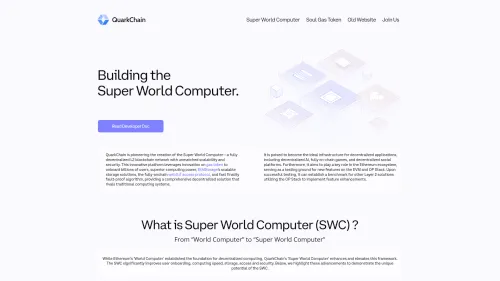QuarkChain (QKC)
QuarkChain is a blockchain platform designed to enhance scalability and transaction capacity. Utilizing a multi-layer architecture and sharding technology, it facilitates efficient peer-to-peer transactions through its native digital currency, QKC.
Overview of QuarkChain
QuarkChain is structured to handle over 100,000 transactions per second (TPS) due to its advanced data distribution system. This scalability is achieved through sharding, which enables the network to meet global commercial standards and perform optimally in high-demand scenarios. Applications such as distributed social media, IoT, and gaming benefit from its high throughput capabilities.
The platform separates its blockchain features into two layers: the sharding layer and the root chain. The sharding layer manages individual blockchains that independently process transaction subsets, increasing the overall transaction capacity. The root chain verifies blocks without processing the transactions themselves.

| Ticker | QKC |
| Category | Infrastructure |
| Website | https://quarkchain.io/ |
| @Quark_Chain | |
| Telegram | quarkchainio |
| https://www.reddit.com/r/quarkchainio/ | |
| Contract Addresses | |
|---|---|
| ethereum | 0xea...64 Copied! Copied! |
| energi | 0x02...93 Copied! Copied! |
QuarkChain supports two types of transactions: shard and cross-shard. Shard transactions occur within the same shard, while cross-shard transactions allow interaction between different shards, setting QuarkChain apart from other solutions. To facilitate these transactions, QuarkChain offers a Smart Wallet that simplifies account management across shards.
QKC, the platform's token, was initially distributed as an ERC-20 token on the Ethereum blockchain. After the launch of the main network, these tokens were converted to the mainnet tokens. QKC is crucial for network transactions and miner compensation and supports smart contracts through the Ethereum Virtual Machine (EVM).
QuarkChain token
The QKC token is a functional utility token essential for engaging with the QuarkChain Network. It is issued as an ERC-20 compliant token on the Ethereum blockchain and is integral to the network's operations. QKC facilitates transactions and interaction within the network, encouraging user participation and resource allocation.
Features of QuarkChain
QuarkChain boasts several key features:
Reshardable two-layered blockchain: QuarkChain consists of a sharding layer for transaction processing and a root blockchain for block confirmation. The system can reshard without affecting the root layer.
Market-driven collaborative mining: Security is ensured through game-theory incentives, allocating 50% of hash power to the root chain to prevent double spending.
Anti-centralized horizontal scalability: To prevent mining centralization, multiple smaller nodes can form a super-full node.
Efficient cross-shard transactions: Quick cross-shard transactions can be confirmed within minutes, with speed correlating to the number of shards.
Turing-complete smart contracts: Supports smart contracts and EVM, facilitating migration for dapps requiring higher throughput.
QuarkChain workability
QuarkChain operates under principles aimed at enhancing scalability, decentralization, and user experience. It simplifies account management, supports diverse dapps, and fosters an incentive-driven ecosystem. The network separates transaction confirmation and ledger state into the Sharding and Root layers, optimizing data distribution and block confirmation.
Elastic sharding layer
This layer handles the current ledger state and transaction processing. It consists of minor blockchains (shards) that can adjust in number to meet demand, contributing to QuarkChain's scalability and flexibility.
Root blockchain layer
This layer confirms transactions and ensures adequate mining difficulty, securing the network without processing transactions directly.
Consensus algorithm
QuarkChain employs a hybrid Proof-of-Work (PoW) consensus mechanism with an ASIC-resistant PoW for mining and a "root chain first" consensus approach for fork resolution. This system requires a double-spend attacker to revert transactions in minor blocks and create a longer root chain fork.
Nodes and clusters
Mining involves Nodes and Clusters, with Nodes being powerful super-full nodes and Clusters comprising smaller nodes. This structure democratizes mining opportunities, providing advantages to smaller participants.
QKC exchange
QKC is actively traded on platforms like Binance, with daily trading volumes exceeding $6 million. Available trading pairs include ETH, USDT, BTC, and XRP.
